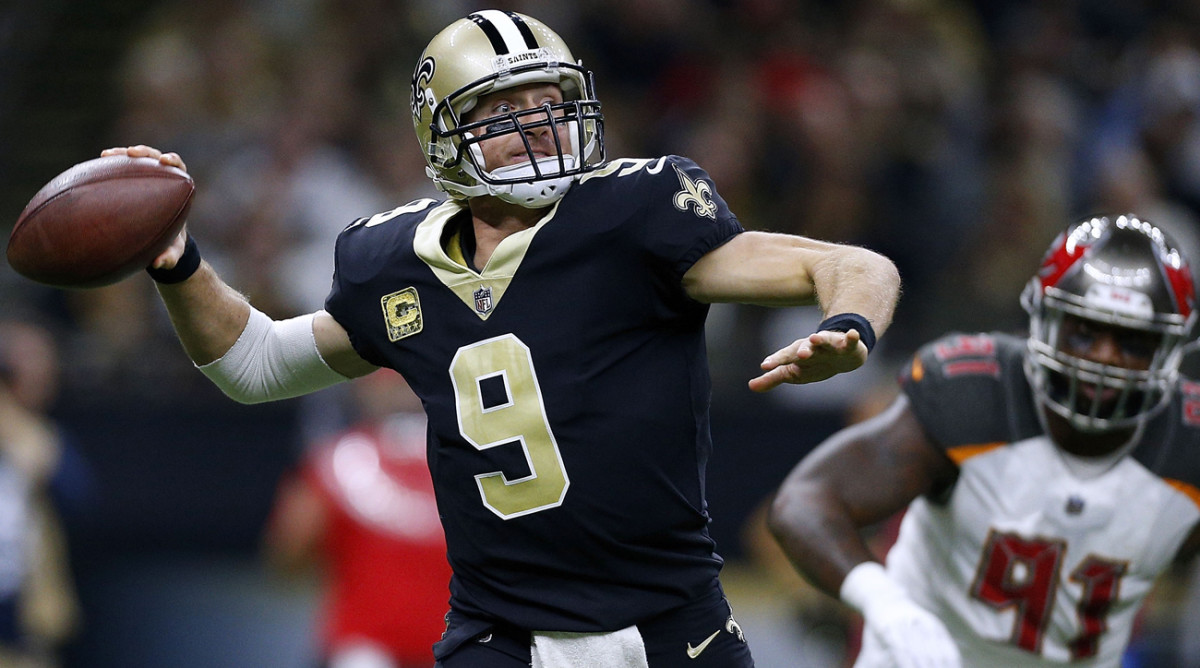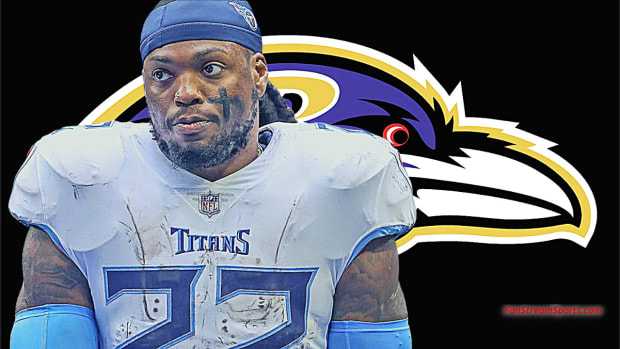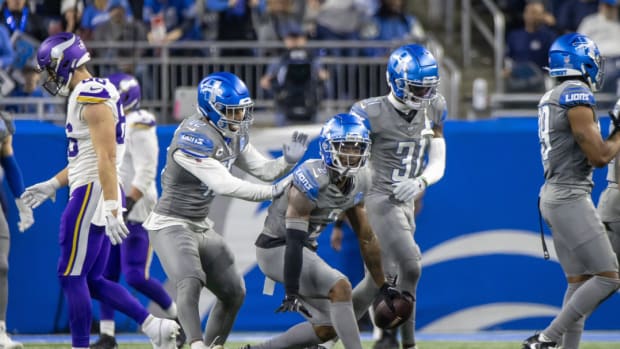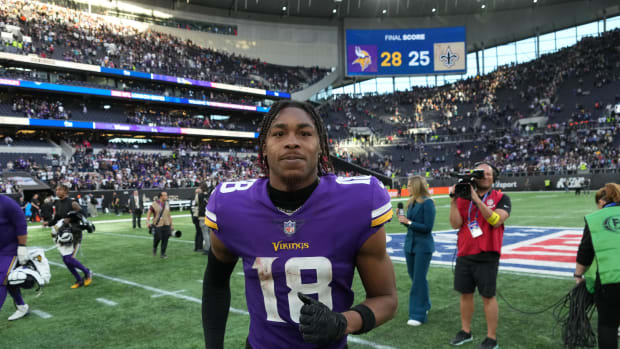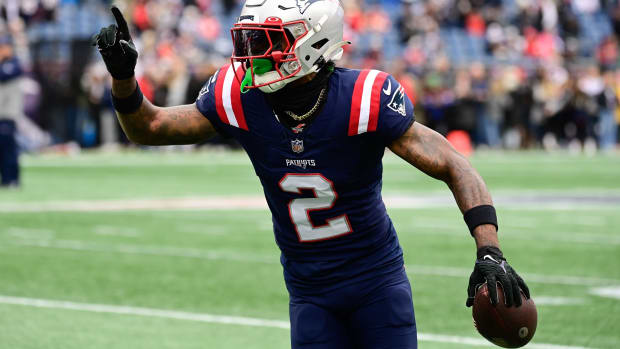Drew Brees, Saints Extend Winning Streak to Six; Kirk Cousins Rallies Washington in Seattle

Off to a 6-2 start, Drew Brees is trying to lead the Saints to their first playoff appearance since the 2013 season.
Jonathan Bachman/Getty Images
Two more takeaways from Week 9, beginning with...
Man, is Drew Brees excited
The Saints snuck up on the rest of the league. Here they are, one of five division leaders with a 6-2 record, and Drew Brees swears: “I’m just telling you, I see this team every day. We’re just scratching the surface.” Look at what Brees did in the feisty 30-10 rout of the Bucs: completed 81 percent of his throws for 263 yards, two touchdowns and no interceptions, a tidy ballgame for someone used to far more explosive days. But the Saints don’t need that from Brees now. That’s because there’s a very good running game here with Mark Ingram and rookie Alvin Kamara (26 total rushes, 145 yards on the ground Sunday, and another 86 receiving yards), and a defense that’s allowed 15 points per game over the past six. Not so coincidentally, the Saints have their first six-game winning streak since 2009.
“They say a quarterback’s best friend is a great running game and a great defense,” Brees said Sunday. “We’ve been getting both.” Another good friend is a good draft—and GM Mickey Loomis provided that. Marshon Lattimore, the 11th overall pick, is probably the leader for defensive rookie of the year. Kamara, selected in the third round, is a latter-day Reggie Bush, with 652 rushing/receiving yards and five touchdowns in eight games. And the defense, with Lattimore starring in a renewed secondary and Cam Jordan playing at his peak only with more help, is a legitimate top-10 unit.
Recent history treated the Saints right. They almost acquired Malcolm Butler from New England in the spring but couldn’t figure the right deal—either for the Patriots or in a contract. So they dealt wideout Brandin Cooks to the Patriots for the 32nd overall pick in the draft, and New England kept Butler. One other X factor: The top two players on New Orleans’ board, in some order, were Lattimore and Texas Tech quarterback Pat Mahomes. So things went very well when:
• Kansas City traded up to the spot ahead of New Orleans, at 10, to take Mahomes. The Saints happily took Lattimore at 11. Lattimore has been a top-10 cornerback in the league this year. It was interesting to hear Lattimore’s post-game talk about the cheap shot Bucs wideout Mike Evans took at him, using a running start and a blindside hit to drill him. “I was shocked,” Lattimore said. “But it’s football. It is what it is. We got the W. That’s all that matters. I’ve seen that before.”
• With the pick acquired from New England, the Saints were going to take Alabama linebacker Reuben Foster. But the Niners jumped them and took Foster. New Orleans took tackle Ryan Ramczyk, which was fortunate: Ramczyk been their best offensive lineman, and he’s played every offensive snap at right tackle.
• In the second round, free safety Marcus Williams was there, and he was an easy pick; now Kenny Vaccaro can play down in the box and do what he does best—play the run and be a cover guy on intermediate routes. Williams has played more snaps than any other defensive back on the team.
“The significance of the draft class can’t be overstated,” Payton said Sunday night. “It’s made all the difference.”
How a Young Defense Is Making the Saints a Super Bowl Contender
And maybe without all the pressure on him, Brees can be healthier later in the year, and play longer, and keep playing at a high level, the way Tom Brady is doing. “I don’t feel any different than I’ve felt in the past few years,” Brees said. “I feel like, like I’m sure Tom does, that I’ve got a great routine and great process to stay on top of the physical part of the game. There’s probably a lot of similarities between us that way.”
Here’s one: New England is 6-2. New Orleans is 6-2.
That’s the best drive of Kirk Cousins’ NFL career
“It ranks right up there,” Cousins said Sunday night from Seattle.
Come on, Kirk Cousins. That was it—the game-winner in a game you had to have. In order of obstacle: Sunday on a sleety day in Seattle, with four neophyte offensive linemen trying to hold off the strongest and deepest front seven in football, with Russell Wilson doing his typical late magic to put the Seahawks ahead 14-10 with 1:34 left in the game, with the crowd going batcrap trying be the classic 12th man in a stadium full of them, Cousins took the field at his 30. He had 94 seconds and two timeouts to win the game and keep 3-4 Washington in playoff contention.
After an incompletion, Cousins rolled right and here came Michael Bennett. Cousins had been used to flipping the ball hurriedly against the heavy rush, with beginners (mostly) on the line. He never saw this pass land because he got leveled. But Brian Quick caught it with two defenders on him. Gain of 31. Quick got popped hard by Kam Chancellor. “I just wanted to put it out there for him and give him a chance,” said Cousins. “Just a chance.” Now came a deep go by 2016 number one pick Josh Doctson. Cousins had a little time this time, and he overthrew Doctson by half a yard. Fine with Doctson. He laid out for it. First down at the Seattle one. Rob Kelley punched it in from the half-yard line. Seventy yards, four plays, 35 seconds.
“Probably the toughest football game I’ve ever played,” said Cousins. Best drive, under the circumstances, I’ve seen Cousins make, and it’s not close.
If there was ever a referendum in Washington on whether to keep Cousins, this was it. He passed. The team has to figure a way to get a contract done with the looming free agent, and if he can’t get signed, he needs to be retained even if under the costly franchise tag. Not many quarterbacks are winning the game Cousins won Sunday. He might occasionally drive you crazy, but winning is made exponentially harder when you don’t have one of those guys.
There was no protecting Luck from Luck
A few thoughts on the Colts shutting down Andrew Luck until 2018 to rehab his surgically repaired throwing shoulder:
• Luck essentially misses three prime years because of a shoulder injury that should have robbed him of one. The Colts believe Luck probably tore his labrum in Week 3 of 2015 and essentially tried to play/rehab/play through it for the next two seasons. The Colts finished 8-8 in 2015, with Matt Hasselbeck playing in relief in a season that ended with Indianapolis out of the playoffs. If, say, Luck had shoulder surgery on Nov. 1 that season, he’d have been able to rehab it and likely play opening week 2016 at something very close to 100 percent. But he missed 10 games over the next two seasons, and with Luck often playing far below 100 percent, the Colts won just 10 of his 22 starts. So Luck missed or was severely hampered during his age 26, 27 and 28 seasons. In his three seasons at that age, Peyton Manning, Luck’s predecessor, threw for 13,024 yards and 105 touchdowns. That’s the prime of a quarterback’s life.
• Playing through the injury likely necessitated more rehab. When 15 months pass between the time of an injury and the time you have surgery to repair it, what happens? You adjust and adapt things like your throwing motion to evade pain and enable yourself to stay on the field. Plus, your body’s coping mechanisms take over. As one NFL medical expert who did not examine Luck’s records said on Friday, it’s likely scarring occurred and more damage was done by Luck overcompensating, making the surgery he had in January 2017 more significant than it would have been 14 or 15 months earlier. Thus the longer recovery time now.
• Luck could need more surgery, and if he does, opening day 2018 is no sure thing. There’s no indication now that he needs another operation. I’m told it’s not likely. But the Colts and his medical team will take the future as it comes.
Andrew Luck's shoulder: How Did We Get Here, and Will the QB Ever Be the Same?
• Luck’s a strong-willed guy, as most great players are, but there needs to be an authority figure who dictates how far players can go when it comes to playing with injuries. Maybe that’s coach Chuck Pagano, or his successor. Maybe it’s GM Chris Ballard (which would be smarter, seeing he wouldn’t be as subject to the emotion of week-to-week coaching decisions). But someone needs to step in, even when a player is playing fairly well (as Luck was last year) and be the referee when a player may be injuring himself further by playing.
• Jim Irsay needs to not give any more medical updates. The Colts’ owner tweeted post-surgery last January that Luck “will be ready for season!” That has haunted this process, particularly when fans fully expected the franchise quarterback to play the season. It’s not fair to the fans. It’s okay to say, “We don’t know.” With a surgery like this one, I’d empower one medical official or one club official to speak for Luck and the team. That’s it. The rest of the organization, including the owner, has to zip it.
It’s amazing to me that, assuming Luck plays pain-free on opening day 2018, it will be two weeks shy of three years since Luck played a game without pain in his shoulder. How unfortunate for a player of his stature. But there are lessons in the Luck story for the Colts, and they’d be wise to learn them.
































